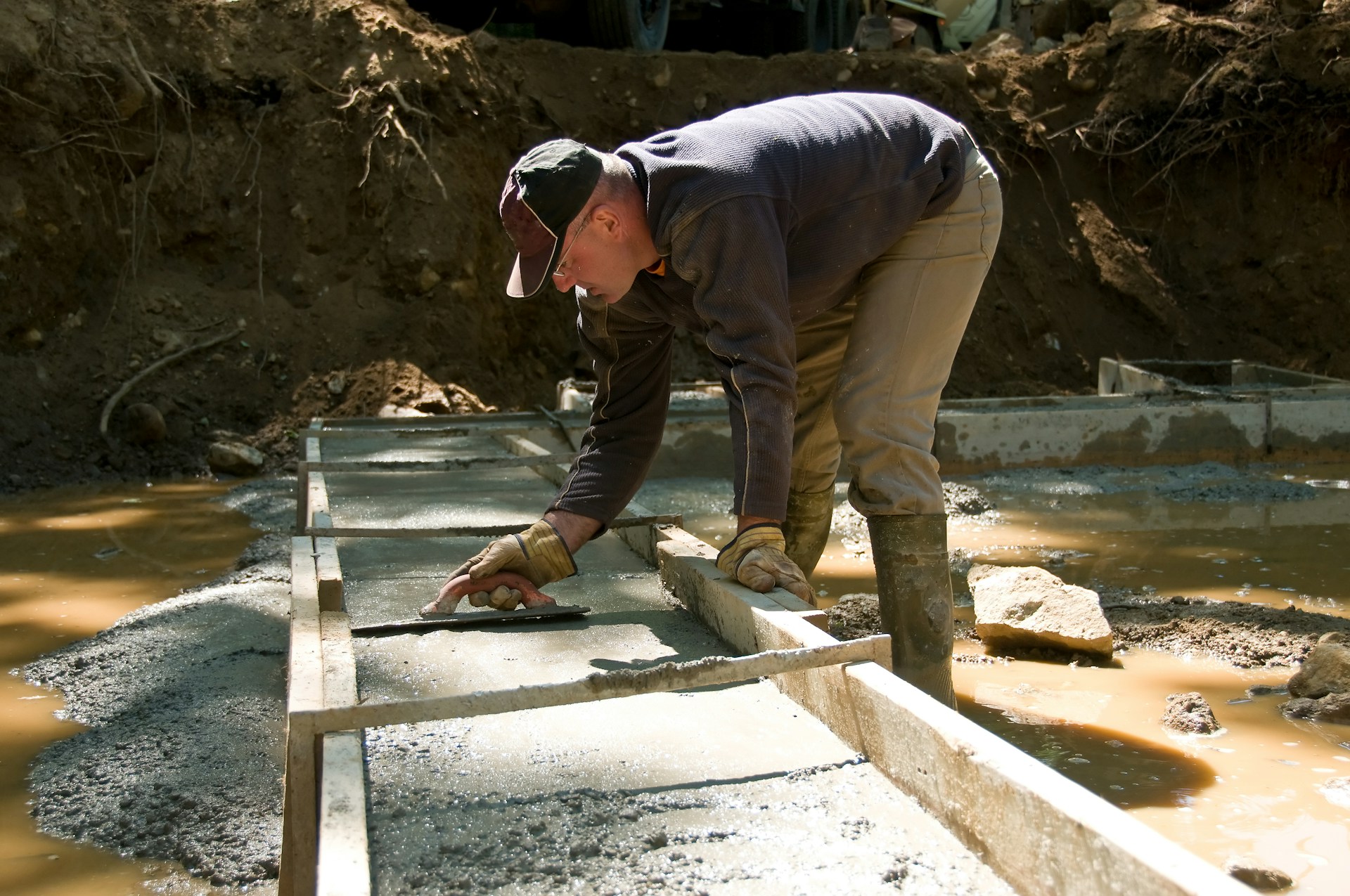If you live in Florida, you’ve likely dealt with shifting soil, standing water, or even sinkholes near your property. Sound familiar?
These natural elements can quietly damage your home’s foundation, causing cracks, uneven floors, and major structural headaches over time.
That’s why foundation repair isn’t just about fixing cracks—it’s about keeping your home stable, safe, and strong in Florida’s unpredictable conditions. And the key is working with professionals who understand the ground beneath your feet.
At Helicon, we’ve helped Florida homeowners since 2004 with solutions that don’t just patch over problems; we solve them from the ground up. From concrete lifting to soil stabilization, our proven methods and clear communication help restore your home’s foundation correctly.
In this blog, you will learn:
- What causes foundation issues in Florida and how to spot them early
- Which repair methods are most effective for Florida soil and structures
- How to choose the right contractor and manage the cost of repair
Let’s break it down!
Understanding Foundation Issues in Florida
Florida homes face foundation challenges due to soil types, weather, and common warning signs. Knowing what causes these problems helps spot issues early and protect your home’s stability.
Unique Soil Conditions and Their Impact
Florida’s ground isn’t like other states; it’s made up of a complex mix of sand, clay, and organic material that behaves unpredictably. Here’s how each soil type plays a role in foundation movement:
- Sandy Soil and Erosion: Sandy soil drains water quickly, but that same drainage can wash soil away from under your home. Over time, this erosion weakens the support beneath your foundation and causes uneven settling.
- Clay Soil Expansion and Shrinkage: Clay retains water and expands when saturated, putting upward pressure on your foundation. During dry periods, it shrinks and pulls away, leaving gaps that trigger sinking or shifting.
- Organic Material Breakdown: Some areas contain decaying organic matter like peat, which decomposes over time. As this material breaks down, empty pockets compromise ground stability.
- Limestone and Sinkholes: Porous limestone lies beneath much of Florida. Water can dissolve it over time, forming hidden voids that lead to sudden sinkholes, making foundation repair especially complex in these areas.
Stabilizing the soil beneath your home is essential. Our repair methods are tailored to handle these ground conditions with precision and long-term results.
Common Signs of Foundation Problems
Watch for clear warning signs in your home to catch foundation issues early. Some common signs include:
- Cracks in walls, especially near doors and windows
- Doors and windows that stick or don’t close properly
- Sloping or uneven floors
- Gaps between walls, ceilings, or floors
If you notice these signs, your foundation may settle unevenly or lose support. Ignoring them can lead to bigger structural problems and higher repair costs. Regular inspections help you catch these problems before they become serious.
How Climate and Weather Affect Florida Foundations
Florida’s climate brings heavy rains, droughts, and hurricanes.
During the rainy season, soil becomes saturated and expands, putting upward pressure on your foundation. In dry periods, the soil shrinks, leaving voids or gaps that cause the foundation to settle unevenly. Repeated cycles of wet and dry cause gradual cracking and shifting.
Storms and hurricanes add risks by flooding soil, damaging nearby structures, and weakening foundation stability. Proper drainage and soil stabilization reduce these risks and help your home stay safe during changing weather.
Foundation Repair Solutions for Florida Homes
Florida homes face unique foundation challenges because of soil conditions and weather. Repair options focus on stabilizing the ground, lifting sinking slabs, and securing the foundation against future damage. Effective repairs target specific foundation types and soil issues to keep your home safe and level.
Slab and Pier Foundation Repairs
Most Florida homes have either slab or pier foundations. Slab foundations are large concrete slabs that can crack or sink over time. Pier foundations use beams supported by posts or piers, which may tilt or shift.
For slab foundations, repairs often involve concrete lifting and leveling. Polyurethane foam injected under the slab lifts and stabilizes it. This process is fast, less invasive, and restores even floors.
Pier and beam foundations need support under the beams or posts. Repairs include replacing damaged piers or adding new supports to stabilize the structure. Proper leveling ensures flat floors and minimized cracks.
Both repairs restore your home’s stability while avoiding significant disruption.
Waterproofing and Drainage Systems
Water damage worsens foundation problems in Florida’s wet climate.
Managing water near your home stops soil erosion and foundation shifting. Installing or repairing drainage systems, such as French drains or gutter extensions, directs water away from your foundation, limiting moisture buildup and soil movement.
Waterproofing your foundation walls prevents seepage that can weaken concrete or wood. Special sealants and membranes block water from entering crawl spaces and basements, protecting your foundation from water damage and extending its life.
Helical Piers and Piling Systems
Deeper support is needed when the soil is weak or when sinkholes are risky.
Helical piers and piling systems are strong steel shafts screwed deep into stable soil or bedrock. These piers provide a solid base beneath new or failing foundations. They stop further settling and can raise sunken parts of your home.
This system is helpful for pool foundations, additions, and homes built over unstable soils. It offers a long-term solution for homes needing extra support.
Our team installs helical piers to strengthen your foundation with precision and care, ensuring lasting stability.
Florida Soil Types and the Best Foundation Solutions
Florida has many soil types, from loose coastal sand to dense clay and limestone-filled regions. Knowing your soil type helps determine your property’s most effective foundation repair method. The wrong approach can lead to recurring damage or wasted money.
Here’s a quick guide to the most common Florida soil types and how our services address each one with precision:
| Soil Type | Location Examples | Common Risks | Recommended Repair Methods |
| Sandy Soil | Coastal regions, Central Florida | Erosion, poor load-bearing, water runoff issues | Helical piers, foam injection, proper drainage systems |
| Expansive Clay | Inland areas, North Florida | Swelling and shrinking, uneven settling | Push piers, soil stabilization, moisture control strategies |
| Organic Soil (Peat) | Wetlands, swampy or reclaimed land | Decomposition, settlement over time | Soil replacement, deep piering, compaction grouting |
| Limestone Base Areas | Sinkhole zones (e.g., Central Florida) | Cavities forming below surface, sudden collapse | Compaction grouting, sinkhole remediation, deep foundation piers |
| Mixed Fill or Loose Backfill | Urban developments, new construction | Unstable support, inconsistent settling | Soil stabilization, slab piers, precision monitoring |
Our free inspection will help identify your soil type and recommend a custom repair plan based on proven engineering standards, so your foundation stays safe, no matter what’s under it.
Choosing the Right Foundation Repair Contractor
It is important to pick the right contractor for foundation repair in Florida. You want someone with the right skills who will answer your questions clearly and honestly.
Qualities to Look for in Florida Specialists
Look for contractors with experience in Florida’s unique soil and weather.
A company like Helicon, trusted since 2004, knows how to handle soft soil and heavy rain. Licensing and insurance protect you and your property.
Check if they use modern methods like helical piers or chemical grout. These solutions work better for Florida’s conditions. Good contractors offer precise estimates and timelines. They also provide references or show reviews from past customers, showing they stand behind their work and care about your satisfaction.
Questions to Ask Before Hiring
Ask what kind of foundation issues they fix most often. Ask about their experience with problems common to Florida, like sinkholes or shifting soil. Request details about their repair methods and why they are best for your home.
Find out if they offer warranties on their work. Warranties give you peace of mind and protect your investment. Also, ask about the total cost and if any extra fees could come up. Clarify who handles permits or inspections.
A trustworthy company will keep you informed every step of the way.
Cost Considerations and Financing Options
Knowing what to expect in costs and how to manage payments helps you plan for foundation repair work. Prices vary depending on the problem’s size and the repair method needed. If upfront costs are a concern, you also have options to make payments easier.
Typical Price Ranges for Foundation Repairs
Foundation repair costs in Florida typically range from $2,000 to $8,000 for common issues like small cracks or settling. More complex problems, like severe sinking or sinkholes, can cost $10,000 or more.
Here are some typical price points:
| Repair Type | Price Range |
|---|---|
| Minor crack repair | $500 – $2,000 |
| Pier installation for settling | $3,000 – $7,000 |
| Sinkhole remediation | $10,000+ |
The size and depth of the repair, soil conditions, and ease of access will affect the cost. Quality repairs prevent expensive damage later.
Financing and Payment Plans
If paying upfront is hard, many companies like Helicon offer financing and payment plans to spread costs. These plans often have low or no interest for a set period.
Typical options include:
- Monthly payment plans based on loan length
- Deferred payments with no interest if paid within a promotional period
- Credit offers designed for home repairs
Before choosing, check the terms carefully to avoid high interest or fees later. Many financing plans also require a credit check. Financing lets you protect your home now without waiting to save the full amount.
Ask your repair company for a detailed estimate and financing options upfront so you can decide what works best for your budget.
Prevention and Maintenance Tips for Florida Homeowners
Caring for your home’s foundation means spotting minor problems early and managing water and soil around your house. These steps help you avoid costly repairs and stabilize your home in Florida’s unique environment.
Routine Inspections and Maintenance
Check your foundation regularly for cracks or uneven floors.
Look inside your crawl space or basement for dampness or mold, as moisture can weaken the structure.
Keep gutters clean to make sure water flows away from your home. Standing water near your foundation can cause soil to shift or sink. Avoid letting heavy objects rest near foundation walls to prevent added pressure.
Call a professional for an inspection if you notice cracks wider than 1/4 inch or doors and windows that stick. Companies like Helicon provide free foundation inspections to catch issues early.
Landscaping Practices to Protect Foundations
Plant trees and shrubs at least 10 feet away from your foundation to prevent roots from disturbing soil stability. Deep-rooted plants can cause soil movement that harms your foundation.
Use mulch and grass cover near your foundation to reduce soil erosion. Avoid planting anything that requires a lot of water near the house, as excess moisture can weaken soil.
Make sure your yard slopes away from your home. A gentle slope of at least 6 inches over 10 feet guides rainwater away and helps prevent water pooling near your foundation walls.
The Bottom Line
Foundation problems in Florida aren’t always visible, but they can quietly threaten your home’s safety and value. From shifting soils to sinkhole risks, your foundation needs more than a quick fix; it needs expert care backed by proven methods.
The good news?
You don’t have to figure it out alone. With over 20 years of experience, Helicon provides custom foundation repair solutions built for Florida’s unique challenges. We don’t just fix problems, we help you protect your home for the long haul.
Schedule your free inspection today and get a clear, honest assessment from Florida’s trusted foundation experts. Your home deserves the right support; let’s ensure it has it.
Frequently Asked Questions
Still have a few questions about foundation repair in Florida? You’re not alone. With shifting soils and unpredictable weather, it’s natural to want more clarity before making decisions. Let’s tackle some commonly asked questions homeowners often search for.
Is it safe to delay foundation repairs if the damage looks minor?
Not really. Even small signs like hairline cracks or sticking doors can indicate deeper issues. Delaying repairs worsens the damage, leading to more costly and invasive fixes. It’s always safer to get an expert’s opinion early.
Can foundation issues affect a home’s resale value in Florida?
Yes, significantly. Visible signs of damage or past foundation repairs without proper documentation can lower a home’s value. Buyers may view the property as risky. Working with licensed professionals and keeping records helps maintain resale trust and value.
Does homeowner’s insurance cover foundation repairs in Florida?
Usually not for damage caused by settling or soil shifts. However, some costs might be reimbursed if the damage is from a covered peril, like a burst pipe or a specific sinkhole policy. Always check your policy or talk to your insurer.
How often should I schedule a professional foundation inspection?
Ideally, once every two to three years, or sooner if you notice signs like cracks or moisture issues. Florida’s shifting ground conditions make routine inspections essential to catch early movement before it becomes a major problem.
Can poor landscaping choices really cause foundation damage?
Absolutely. Trees planted too close or overwatering near the home can dry out or oversaturate the soil unevenly. That imbalance causes shifting, especially in clay-heavy or sandy areas. Smart landscaping helps maintain long-term foundation stability.





